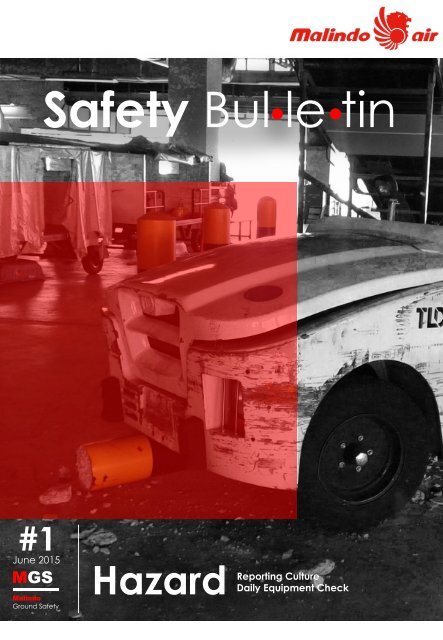Safety Bul le tin
Create successful ePaper yourself
Turn your PDF publications into a flip-book with our unique Google optimized e-Paper software.
<strong>Safety</strong> <strong>Bul</strong> <strong>le</strong> <strong>tin</strong><br />
#1<br />
June 2015<br />
MGS<br />
Malindo<br />
Ground <strong>Safety</strong><br />
Hazard<br />
Repor<strong>tin</strong>g Culture<br />
Daily Equipment Check
MGS Malindo Air Ground <strong>Safety</strong><br />
Hazard<br />
What is hazard?<br />
Definition of hazard is a source of danger which can be harm to anybody and<br />
also can <strong>le</strong>ad to incident or accident. The term of hazard is common use in<br />
aviation sector to indicate the source of danger. For examp<strong>le</strong>, foreign object<br />
debris (F.O.D) which found on apron is a hazard. Why F.O.D categorized as<br />
hazard? The reason is because F.O.D potentially cause damage to aircraft<br />
especially to the aircraft engine. F.O.D also can be harm to any personnel who<br />
working at apron if the debris flown by effect of the jet blast.<br />
What is F.O.D?<br />
In aviation, F.O.D is a abbreviation<br />
for Foreign Object Debris, e.g.<br />
substance, debris or artic<strong>le</strong> alien<br />
to a vehic<strong>le</strong> or system which<br />
would potentially cause damage,<br />
e.g. nuts, baggage debris etc.<br />
F.O.D also known as Foreign<br />
Object Damage, e.g. what<br />
happens when a jet engine sucks<br />
up a rock on the runway or a bird<br />
in flight. Finger of Death is a<br />
distressingly apt description of<br />
what this generally does to the<br />
engine.<br />
The above picture is an examp<strong>le</strong> of Foreign Object<br />
Damage.
MGS Malindo Air Ground <strong>Safety</strong><br />
What is ‘Lackadaisical’ Attitude?<br />
Lackadaisical is someone lacking spirit or interest.<br />
An examp<strong>le</strong> of someone who would be described as lackadaisical is a person<br />
who makes a disinterested and half-hearted attempt at his/her work. If you<br />
keep lackadaisical attitude, you are not just put yourself in danger but your<br />
col<strong>le</strong>agues too. When you found F.O.D., you must pick it up and dispose it into<br />
nearest F.O.D bin to avoid any incident or accident. The above picture is the<br />
best examp<strong>le</strong> of what F.O.D. can do to you!<br />
Found F.O.D? Pick it up! Dispose it into F.O.D. bin.
MGS Malindo Air Ground <strong>Safety</strong><br />
Importance of<br />
Repor<strong>tin</strong>g Culture.<br />
What is repor<strong>tin</strong>g culture?<br />
A repor<strong>tin</strong>g culture means cultiva<strong>tin</strong>g an atmosphere where peop<strong>le</strong> have<br />
confidence to report safety concerns without fear of blame. Employees<br />
must know that confidentiality will be maintained and that the information<br />
they submit will be acted upon, otherwise they will decide that there is no<br />
benefit in their repor<strong>tin</strong>g.<br />
Why must report?<br />
Col<strong>le</strong>c<strong>tin</strong>g hazard, near-miss, incident & accident reports helps create a<br />
culture that seeks to identify and control hazards, which will reduce risks<br />
and the potential for harm.<br />
Who need to report?<br />
Everyone should get involved in repor<strong>tin</strong>g culture particularly ground<br />
operation staff who directly exposed with hazard and injury. In aviation<br />
sector, RAMP staff is the one who exposed to hazard. To prevent any<br />
incident or accident, employer need all the information from the<br />
personnel itself to imp<strong>le</strong>ment hazard identification, risk assessment and<br />
risk control.<br />
How to report?<br />
For Ground Operations staff, you can lodge your report to your superior.<br />
Your report is an essence to prevent any incident or accident from<br />
occurred and indirectly may reduce staff injuries and company losses.
MGS Malindo Air Ground <strong>Safety</strong><br />
Have you done your<br />
Daily Equipment Check?<br />
What is Daily Equipment<br />
Checklist?<br />
Daily Equipment Checklist is a list of equipment items or part to be checked.<br />
What to check?<br />
All user of equipment and vehic<strong>le</strong>’s driver must check the condition of the equipment<br />
and vehic<strong>le</strong>. They also need to ensure that the equipment is in good working condition<br />
before use it for operations. For a vehic<strong>le</strong>, it’s including Airfield Vehic<strong>le</strong> Permit (AVP)<br />
expiry date. Do not use the vehic<strong>le</strong> for operations if the AVP already expired. All of the<br />
details can be referred to Daily Equipment Checklist Form.<br />
Why must check?<br />
As stated in Regulation 107. Use of the movement area, CIVIL AVIATION REGULATIONS<br />
1996; (32) The owner of every vehic<strong>le</strong> used in the movement area shall ensure that the<br />
vehic<strong>le</strong> is maintained<br />
in good working condition.<br />
Any defects need to be reported to GSE by issue an Equipment Defect Report (EDR)<br />
for corrective action. If fai<strong>le</strong>d to do so, the user will be subject to disciplinary action.<br />
It was intended to minimize risk and avoid any incident or accident during operations.<br />
It is a must for every vehic<strong>le</strong>’s user to run daily check during vehic<strong>le</strong> handover before<br />
started their operations.


